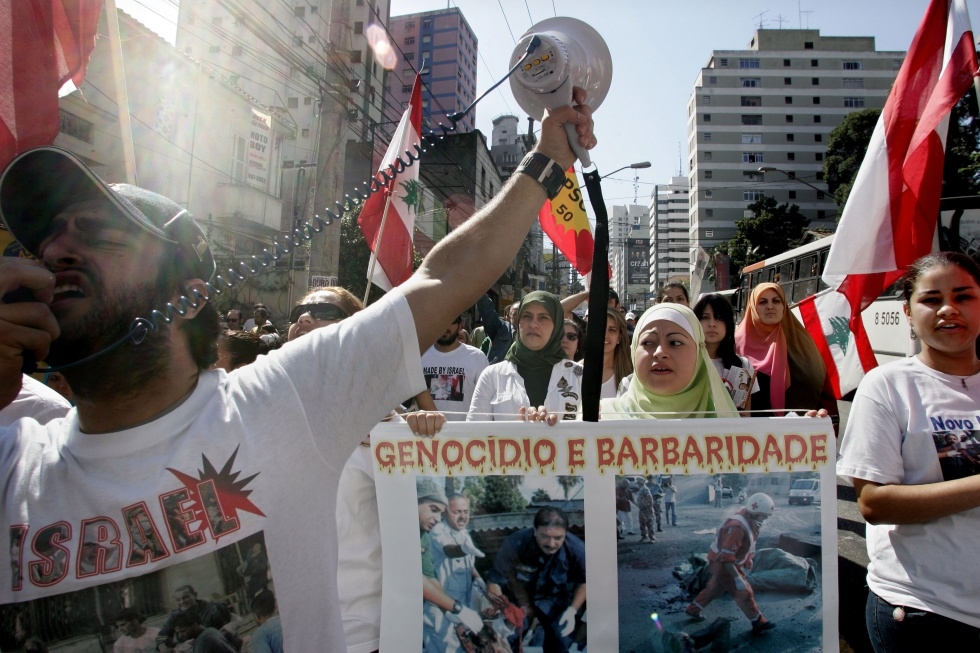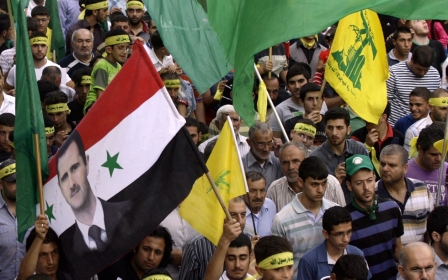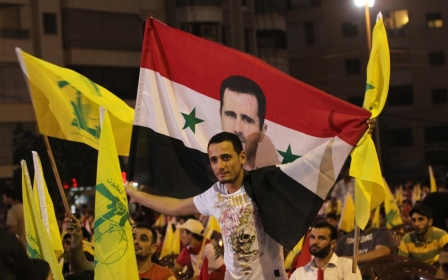Targeting Hezbollah's ‘Achilles’ heel’

In a recent op-ed for the Washington Examiner, US Representative Mark Meadows outlined his reasons for introducing the Hezbollah International Financing Prevention Act in Congress, which would target a financial network he refers to as “Hezbollah’s Achilles’ heel”.
A Republican representative of the state of North Carolina and a member of the House Foreign Affairs Committee, Meadows introduced the legislation in collaboration with three colleagues, among them Committee Chairman Ed Royce (R-Calif.).
Before delving into the content of the proposed bill in his article, Meadows provides a bit of counterfactual history:
“Hezbollah is responsible for the largest number of American deaths overseas by a terrorist organization second only to al-Qaeda. Its deadly global reach has included bombing US targets in Lebanon during the 1980s, Israeli and Jewish targets in Argentina in the 1990s, and recent attacks in Europe and Southeast Asia.”
This piece of pseudo-trivia about American deaths in Lebanon is one that is regularly invoked by fearmongering politicians and pundits with no regard for context. For starters, the October 1983 attack on the US Marine barracks in Beirut - which killed 241 servicemen and was claimed by the Islamic Jihad Organisation, a precursor to Hezbollah - occurred in response to Washington’s decision to insert itself into the Lebanese civil war as a combatant.
New MEE newsletter: Jerusalem Dispatch
Sign up to get the latest insights and analysis on Israel-Palestine, alongside Turkey Unpacked and other MEE newsletters
Retired Marine Corps Colonel Timothy J. Geraghty, the commanding officer of the attacked unit, subsequently wrote that the shelling of a Lebanese mountain town by US warships in September 1983 “removed any lingering doubts of our neutrality, and I stated to my staff at the time that we were going to pay in blood for this decision”.
Meadows’ incrimination of Hezbollah in Argentina is even more problematic. As award-winning historian and journalist Gareth Porter demonstrated in a meticulous report for The Nation in 2008, all fingers in fact point away from Hezbollah and Iran for the 1994 attack on the Argentine Israeli Mutual Association in Buenos Aires, in which 86 people were killed.
In the aftermath of the bombing and amid shrill insistence from the US and Israel that the plot had been cooked up by Islamic terrorists in the tri-border area between Argentina, Brazil, and Paraguay, a Paraguayan special forces unit was established to investigate such claims. José Almada, a superior officer in the unit, confirmed to me during a visit to Paraguay last year that no evidence had thus far turned up-despite regular encouragement, he said, from the CIA.
As for Meadows’ efforts to pin the blame for “recent attacks in Europe and Southeast Asia” on Hezbollah, these are simply additional examples of how to go about creating facts on the ground through sheer repetition. It helps, of course, when one’s domestic audience has been conditioned to eschew critical thinking at all costs.
Narco-jihad and terror charities
Moving on to the components of Hezbollah's “Achilles’ heel” - the financial network that allegedly enables the organisation’s nefarious prosperity - Meadows asserts that “a significant portion of Hezbollah’s profits are earned through drug trafficking in Latin America and worldwide”.
This accusation is nothing new, and, as I’ve pointed out time and again, experts in the matter aren’t too picky when it comes to assembling “proof”. At a 2011 congressional subcommittee hearing on Hezbollah in Latin America, for example, one analyst swore that “Venezuela’s geographic proximity to West Africa make [sic] it an ideal launching pad” for drug shipments, thus facilitating the Party of God’s illicit activities.
This is not to say, of course, that no profits from the international drug trade could possibly end up in Hezbollah's coffers; the group does, after all, receive financial support from people all over the world, and drug traffickers are people too. But to argue, as Meadows does, that Barack Obama should officially “define Hezbollah as a ‘global drug kingpin’” is nothing short of ludicrous.
It’s also entirely hypocritical, seeing as Washington has been in cahoots with drug lords in Latin America since before Hezbollah was born. The deleterious effects of such partnerships were acutely felt in the 1980s when the US facilitated the funding of right-wing paramilitaries in Nicaragua via the drug trade, to the detriment not only of that nation but also African-American communities in South Central Los Angeles ravaged by the resulting crack cocaine epidemic. More recently, Mexico’s El Universal newspaper revealed that the US government had been collaborating for years with the notorious Sinaloa cartel, among others.
In addition to furthering empire’s political aims, the drug trade has proved financially lucrative. Scholars Oliver Villar and Drew Cottle note in their book Cocaine, Death Squads, and the War on Terror: US Imperialism and Class Struggle in Colombia: “The cocaine decade [of the 1980s] saw the consolidation of the Colombian drug trade as a source of profit for US capital via banks that were established to launder and invest drug money in legitimate US corporations”.
But let us not stray too far in the direction of fact. Returning to Meadows’ narrative, we learn that Hezbollah's “Achilles’ heel” also encompasses charitable organisations such as the Al-Mabarrat Charity Association-“an identified charity that funnels money to Hezbollah’s terrorist activities”.
As political analyst Dr Sarah Marusek explained in an article last year for Middle East Monitor, the Michigan offices of Al-Mabarrat were raided by the FBI in 2007 as part of the post-9/11 “legal efforts to criminalise compassion in the US, ultimately denying Muslim-Americans… the right to freely practice their religion”. These particular offices were allowed to remain open, unlike certain other Islamic charities raided at the same time.
Al-Mabarrat was founded by the late Shiite cleric Mohammed Hussein Fadlallah, whom the US incorrectly insisted on regarding as a representative of Hezbollah and who survived a 1985 assassination attempt in Beirut by CIA-trained operatives. The car bombing killed approximately 80 civilians, many of them women and children. If Meadows wants to talk about “terrorist activities”, this sounds like a good place to start.
A culpability assessment
According to Meadows’ op-ed, the Hezbollah International Financing Prevention Act “codifies into law the policy of the United States to prevent Hezbollah’s global logistics and financial network from operating”, with the aim of “crippl[ing] Hezbollah's operations”.
The congressman preaches: “We must send the message to… individuals [caught up in the network] that as long as they continue to knowingly do business with Hezbollah, they are as culpable for attacks against innocent civilians as the terrorist group itself”.
Three paragraphs later, Meadows mentions the threat posed by Hezbollah to “our great ally, Israel” - an entity whose name is intimately associated with the phenomenon of civilian slaughter but with whom the US of course continues to “knowingly do business”, to the tune of more than $3 bn in annual donations. Such charity undeniably sustains Israel’s homicidal endeavors, which suggests that there’s a lot more culpability to go around than Meadows would have us believe.
It bears mentioning that Hezbollah’s very raison d'être lies in the 1982 Israeli invasion of Lebanon, which killed approximately 20,000 Lebanese and Palestinians, most of them civilians. In a matter of three days in September of that year, up to several thousand people were massacred in an Israeli-orchestrated attack on the Palestinian refugee camps of Sabra and Shatila in Beirut.
Since then, highlights of Israel’s charitable missions in Lebanon have included intermittent military assaults such as the one in 2006 that claimed some 1200 lives, primarily civilian. This particular war merited expedited bomb shipments from the US to the Israeli army. Again, if Meadows wants to talk about complicity in “attacks against innocent civilians”, there are plenty of jumping-off points.
In an August 2006 essay for the London Review of Books, Israeli poet and author Yitzhak Laor wondered with regard to the victims of Israeli crimes in Lebanon: “How many atrocities can a person keep in mind, how much helplessness can he or she admit, how many massacres can people tell their children about, how many terrorised escapes from burning houses, without becoming a slave to memory?”
Some people, on the other hand, are beholden neither to memory nor to present realities, and Meadows concludes his Washington Examiner advertisement with the proclamation: “It is time to take a stand against the threat Hezbollah poses to the United States and its allies. By cutting off Hezbollah’s lifelines to international financing, we can break its cycle of violence around the world”.
Even if Hezbollah were somehow disappeared, there’s little danger that global “cycle[s] of violence” would go along with it - the United States and its allies will help see to that.
- Belen Fernandez is the author of The Imperial Messenger: Thomas Friedman at Work, published by Verso. She is a contributing editor at Jacobin magazine.
The views expressed in this article belong to the author and do not necessarily reflect the editorial policy of Middle East Eye.
Photo: Members of the Arab community shout slogans supporting Hezbollah and its leader Hassan Nasrallah during a rally organized by the Lebanese community living in Sao Paulo, Brazil (AFP)
Middle East Eye delivers independent and unrivalled coverage and analysis of the Middle East, North Africa and beyond. To learn more about republishing this content and the associated fees, please fill out this form. More about MEE can be found here.




